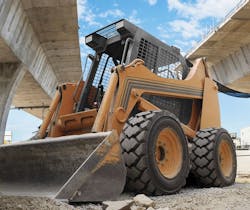An improving economy and products that address specific application and performance needs are fueling sales of skid steer tires, according to dealers and manufacturers. Customers are relying on commercial dealers to help determine the product best suited for their needs.
“The market is flooded with cheaper, poor quality products, but customers are tired of paying for what doesn’t work. We find customers want a quality product with a dealer who stands behind it,” says Tom Van Ormer, director of purchasing for East Bay Tire Co., a family-owned tire wholesaler, exporter and commercial dealer with nine locations across California and Hawaii.
“The skid steer market continues to be dominated by quality bias products,” says Van Ormer. “Radials, though possessing marketable traits, are still a hard sell in a price-driven market. Solids are increasing every day, especially in recycling and other difficult condition applications.”
Sales of bias, solid and radial skid steer tires are improving at Valley Tire Co. Inc., according to Kirk Smiley, OTR division manager for the Charleroi, Pa.-based retail and commercial dealer. “I think generally it has to do with the housing and light construction business segment. That’s been stagnant for a few years and is starting to come around.”
Valley Tire sells and services industrial, farm and heavy equipment tires through 15 outlets in New York and Pennsylvania. Tires for skid steers used for landscaping and light construction make up a large part of the company’s business. Customers “generally go for the imported bias ply tire and foam fill if they need to,” says Smiley. Valley Tire promotes foam-filling of bias tires, which is a profitable segment for the company. Although foam-filling enables the pressure of the tire to be adjusted to suit the application, Smiley says sometimes only a solid tire will fit the need. “We do sell solids. There are applications poly fill can’t handle. The tread’s just not strong enough.”
Sales of radial skid steer tires are up despite their higher price. “Radial is still more of a difficult push only because of the price point,” says Smiley. He says the company is excited about Michelin’s airless radial tire, the Tweel. “It provides a nice smooth comfortable ride, it can’t go flat, and it’s not heavy and hard. There’s lots of interest in the Tweel. I think once it’s proven itself, it’s going to be a big mover for Michelin and for us.”
Sales of radial and bias skid steer tires are up for Mighty Tire Wholesale Inc., the wholesale arm of Ziegler Tire & Supply Co. in Massillon, Ohio. “The radial skid steer business continues to grow as the Michelin brand has set a high standard for durability and wear,” says John Ziegler Jr., director. “The introduction of the Tweel product will be very interesting and exciting for 2015. The increased number of import radial skid steer tires is pushing the market more in that direction and will continue to grow. Better traction, operator comfort and lower cost per hour all contribute to more radial sales.
“The bias market is still very solid. The Samson brand skid steer is both economical and functional for our users in this segment, and Carlisle has gotten back on track with the reintroduction of the Guard Dog product that has performed much better for a premium bias offering.”
Increasing demand for skid steer tires
East Bay Tire’s Van Ormer predicts demand will improve. “As the rental companies and the construction industry, as well as the economy in general, continue their rebound, we anticipate increased growth in skid steers as well as increased growth in solid products. In our home market of California, this is tempered by the need for more rain and snow.”
Skid steer tire manufacturers also expect more sales. Camoplast Solideal Inc. sees demand for skid steer tires continuing to increase in regions that enjoy positive economic growth along with healthy construction activity, according to Mike Dembe, market development manager, North America – construction. “This year we do see a slower more sustainable rate of growth as compared with some of the hyper growth that we saw in the immediate post-recession years where people were reloading their inventories.”
James Crouch, North America farm segment marketing manager for Michelin North America Inc., says fleets are becoming more cost conscious, which is driving growth in demand for radial tires and growth in the industrial market. “They are looking at total cost of ownership instead of initial purchase price. Additionally, they are more aware of driver comfort benefits.”
Randy Tsai, director of marketing and GBC motorsports for Greenball Corp., sees a demand for new technology and designs. “As these products and designs are introduced, the demand for these new products will increase. For new products with new features and benefits, we believe that demand will increase. But for the older standard treads and designs, we believe that demand will remain steady if not begin to decrease.”
Alliance Tire Inc. also expects growth to continue, according Domenic Mazzola, vice president of product development. “There are literally hundreds of attachments. These machines can do so many different things so a one-size-fits-all tire doesn’t work. That’s why you see these premium specialized tires come into the market.”
What’s ahead for skid steer tires? Several manufacturers shared their perspectives with MTD.
[PAGEBREAK]
MTD: What are the technological or market trends in skid steer tires?
Dembe, Camoplast Solideal: We do see a continuing trend toward proven solid tire technology and solutions. We know the design and the aperture technology has improved to the point where for many users switching to a hassle-free, more durable solid tire solution increasingly makes more sense.
When this technology was in its infancy a dozen years ago, solid tires were reserved for only the most severe or extreme applications, typically demolition or waste recycling. But today, with this improved technology and the resulting increased market acceptance, their use is commonplace and is so widespread to the point where we see less severe landscaping and more commonplace construction companies adopting solid tire technology.
Crouch, Michelin: The strongest trends we are seeing in the market right now are a push for radialization in skid steer and backhoe tires. The large OEMs are starting to offer radial tires on their machines to both increase traction and improve ride quality. This industry is very focused on maximizing the productivity of a machine by reducing flats and tire endurance-related failures. Michelin has developed premium radial tires such as the Michelin Bibsteel skid steer tire that are intended to minimize downtime and drive a higher return on investment through a steel-belted casing that allows added resistance to punctures and a radial footprint that provides an even contact patch for longer tread life and increased traction.
Jack Olney, director of sales, Michelin Tweel Technologies: Michelin has also developed an airless radial, the X Tweel SSL, which eliminates downtime due to flats while providing excellent traction, durability and operator comfort.
Tsai, Greenball: We are seeing greater demand for newer tread designs. Most customers are looking for more “all-terrain” designs that are friendlier for hard pack and asphalt terrain.
Better wear and puncture resistance seems to also be high on the list as well. Another reason for a more closed tread design is puncture resistance in the tread area.
Van Ormer, East Bay Tire: The EBT Air Dawg, a solid skid steer available in a smooth and traction design, has doubled in sales the last year, and we anticipate this growth to continue as we offer it in an assembly for the first time. Our Big Dawg, Bad Dawg, Ruff Dawg (hard surface) and Skid Dawgs are very popular sellers. Our Skid Dawg offers a unique design with a deeper tread depth.
Mazzola, Alliance: We see a continuing move toward the specialized, more premium type, application-driven tires. One example would be tires for severe service like a scrap yard. You tend to see a greater use of solid tires there. And more suppliers are offering solid skid steer tires. Alliance is rolling out a line of solid tires in North America right now. We’re starting slow with two key sizes, 31x10-20 and 33x12-20. Another example of application-driven products is R-4 type tread patterns that are extremely deep for people in soft muddy conditions. We have a super deep R-4 pattern in the main sizes. With the inclusion of the solids, we have 13 different tread patterns.
MTD: Are you seeing a push for more radialization in skid steer tires? If yes, what is driving the demand?
Dembe, Solideal: Radial tires for skid steer tires have been around for a long time, and we really do not see any significant market growth in this area. For most slower-speed, compact construction equipment, the benefits of radial technology are quite muted. Radial tire technology does have many benefits but those only become evident at higher speeds typically.
Crouch, Michelin: The market for radial skid steer tires is growing at a steady pace right now. The markets Michelin focus on for skid steer tires include construction, livestock, landscape, contracting, refuse/recycling and agricultural industries. Right now, the construction market and the livestock markets are seeing a recovery. New housing starts are still in a very good place and livestock prices are high. The demand for premium radial skid steer tires will continue to increase over the next few years mainly because of a push from the OEMs to include it in their product offer.
Van Ormer, East Bay Tire: We are seeing a slight increase in radial forklift products, but not in any portion comparable to other segments of our industry, like ag or OTR tires.
Tsai, Greenball: The driving demand/inquiry for radial skid steer seems to be based on what technologies might improve wear, performance and longevity. We’ve only begun to explore this aspect.
Mazzola, Alliance: We don’t see it growing as much as it has in other segments like agriculture where radials offer specific clear advantages. The bias tire has more reinforcement in the sidewall which is one of the characteristics that makes it desirable for a skid steer. ■
About the Author

Ann Neal
Ann Neal is a former senior editor at Modern Tire Dealer.
